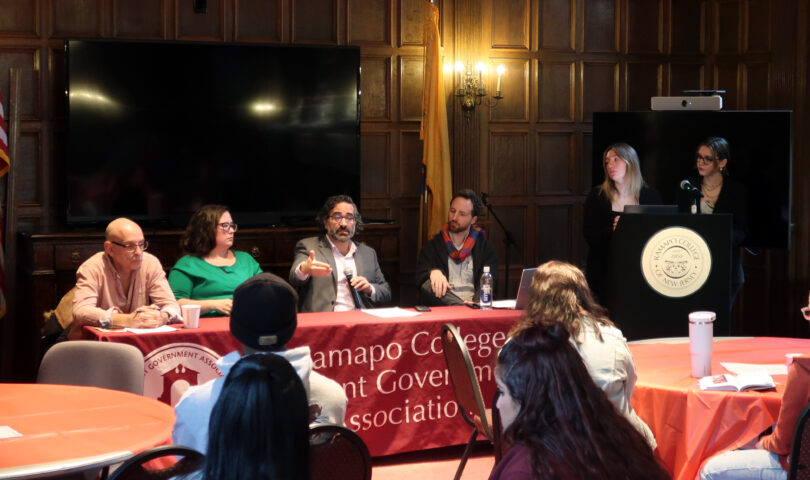The pre-law fraternity Phi Alpha Delta’s Programming Chair and Student Government Association Chief Justice, Liz Mendicino, hosted the fraternity’s Freedom of Speech Fair on Nov. 15. Amanda Short, a fellow Phi Alpha Delta member, accompanied Mendicino.
Mendicino opened the event as the panel’s moderator. “We are here to foster a respectful environment,” she said before introducing each panelist. The panelists were four Ramapo professionals: Dr. Jacob Ari Labendz, the Director of the Gross Center for Holocaust and Genocide Studies, Dr. Kaitlin Sidorsky, associate professor of political science and public policy, Dr. Peter Heinze, professor of clinical psychology and Dr. David Gurney, assistant professor of law and society and director of the Investigative Genetic Genealogy Center.
Early in the discussion, Labendz mentioned how glad he was to join the panel and his interest in discussing wellbeing and harmlessness.
“How can we manage free speech, but at the same time, be a society that is safe in the sense that we are not producing violence? Where are these limits?” he said.
The conversation turned to why freedom of speech is essential in political science. “When I think about this question, I think about who gets heard, when they get heard and why they get heard in public and political spaces,” Sidorsky said.
A few of Sidorsky’s specialties include the formation of the American government, gender and politics, public policy and state government. She explained that she often studies groups of people who are victims of violent crimes and are often overlooked because of their age, race or ethnicity.
“When I think of freedom of speech, I wonder why there are policies out there that don’t protect the people who probably need it the most,” she said. “Why do some people get heard and others get silenced?”
Heinze’s analytical psychology expertise added a fresh lens through which to view free speech.
He prefaced his ideas by saying, “In many areas of academia, free speech advocacy is beginning to be conflated with conservatism. I am not conservative. I shouldn’t have to say that.”
His knowledge of psychology and political science serves as the foundation of his belief that discussions of free speech should not be bound to the right or left political perspective but instead should be a union of perceptions that allow students to learn how to debate appropriately.
“Why do alternative ideas threaten us?” he said.
Mendicino asked the panelists about freedom of speech in relation to book bans.
Gurney discussed the differences in how people define free speech. “Freedom of speech is often bandied about as kind of a catchphrase… If you define free speech as access to any book at any time no matter what age you are or what kind of institution you’re in, then we don’t have free speech, but I don’t think most people would take that extreme of an example of what free speech constitutes.”
Although the panel did not resolve the debate on how free speech should be defined, it succeeded in demonstrating the importance of its protection in academic and political spaces and beyond.
klombar5@ramapo.edu
Featured photo by Keely Lombardi






